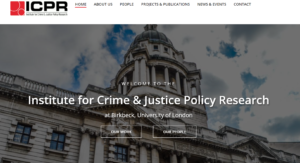By Dr Amy Kirby and Professor Jessica Jacobson
X: @ICPRtweet Linkedin: https://uk.linkedin.com/in/jessica-jacobson-b36a5522
A very warm welcome to the first post of this new SLSA Guest Edited Blog Series from academics and researchers at the Institute for Crime and Justice Policy Research (ICPR), at Birkbeck, University of London. At ICPR we have a long track record of producing academically-grounded, policy-oriented research into the courts and the judicial process, with a specific focus on lay participation and lived experience. Our previous courts work has included a study of defendants’, witnesses’ and victims’ experience of the Crown Court; a cross-jurisdictional study of practitioner perspectives on the meanings of ‘participation’ in courts and tribunals; and several smaller studies on the quality of criminal advocacy and on problem-solving methods in the youth court. Common themes across these projects include a concern with what ‘participation’ in the courts means, to whom, in what contexts – and its various limits and enablers. These issues connect with broader legal and theoretical debates on a range of themes, such as access to justice, effective participation, legitimacy, procedural justice, and legal socialisation. In addition to furthering academic discourse on lay participation in the courts, we also seek to achieve policy, practice and societal impact through the production of policy briefs and guidance and training materials.
In this blog, we hope to extend this body of work by reflecting upon, and engaging the socio-legal community in, debates about contemporary methodological approaches; whilst also stimulating discussion of novel and emerging legal issues on the topic of lay participation in the courts. We will do this by putting two of our current projects under the spotlight: Lived Experience of the Law: A Research and Policy Project (funded by the Nuffield Foundation) and Voicing Loss: Meanings and implications of participation by bereaved people in inquests (funded by the Economic and Social Research Council).
The Voicing Loss project, conducted by ICPR in partnership with the Centre for Death & Society at the University of Bath, is focused on the under-researched coronial jurisdiction. In England and Wales, coroners are judicial officers appointed by the local authority with responsibility for investigating deaths which are violent, unnatural or unexplained or which occurred in state detention. The purpose of the investigation is to determine who died and how, when and where they died. Where necessary, the investigation culminates in an inquest: an inquisitorial, fact-finding hearing, generally held in public, and sometimes with a jury. Against the backdrop of a policy commitment to place the bereaved ‘at the heart’ of the coroner service, Voicing Loss has examined how the role of bereaved people in coronial death investigations is defined in law and practice, and what the role entails in practice. The project has also sought to identify ways in which the inclusion and participation of bereaved people in the coronial process can be better supported. A series of project outputs – including findings papers, policy and practice briefs, public information, and an expert insights blog – will be published on a dedicated project website to be launched in June 2024. As part of this blog series, the Voicing Loss project team will author posts on the mismatch between bereaved people’s expectations and experiences of the coronial process, and on the presentation of ‘pen portraits’ of the deceased at inquest hearings.
The Lived Experience of the Law project, which we are conducting in partnership with the charity Revolving Doors, adopts a narrative interviewing approach to examine how lay perceptions and expectations of legal rights are shaped by formal and informal encounters with the law over time and across jurisdictions (criminal and family). At the crux of this is a concern with how the concepts of ‘effective participation’ and ‘access to justice’ can be most usefully defined from a lived experience perspective; what the barriers to participation and access are; and what reforms are needed to address these challenges and support change. The project team includes peer researchers with lived experience of the courts, who have been appointed and trained by Revolving Doors, and the project will be the subject of a short film produced by the Criminal Justice Alliance and Media Trust Films. The film will highlight the process of co-production, including the ways in which those with lived experience can influence research and policy reform. The project is in its preliminary stages, and thus this blog series allows the socio-legal community to follow the project in real time. In the next blog post, Gillian Hunter and Nicola Campbell will present the findings from the recently completed study pilot which examined public law proceedings in the family court. Future posts by the project team, including the peer researchers, will reflect on peer research and co-production, and disseminate key findings as they emerge.
Upcoming posts:
May 2024 Lived Experience of the Law: Public law proceedings in the family court
June 2024 Voicing Loss: ‘I needed more than answers’
Sept 2024 Lived Experience of the Law: Methodological Reflections
Nov 2024 Lived Experiences of the Law: Peer Researcher Blog
Jan 2025 Voicing Loss: Reflecting and including the deceased in inquest hearings
April 2025 Lived Experience of the Law: Emerging themes and Policy Workshops
Sept 2025 Lived Experience of the Law: Findings Launch
For further information, please contact the guest blog series editor: Dr Amy Kirby








Leave A Comment